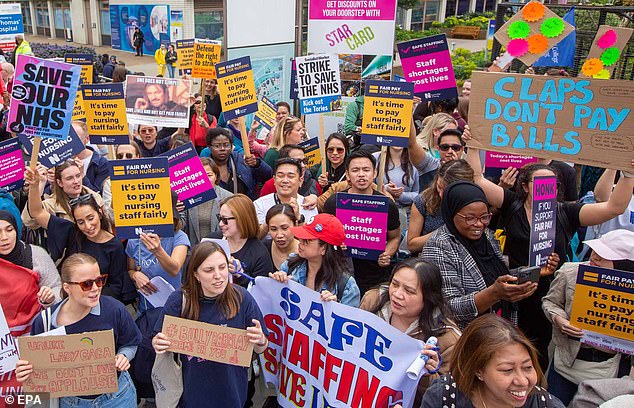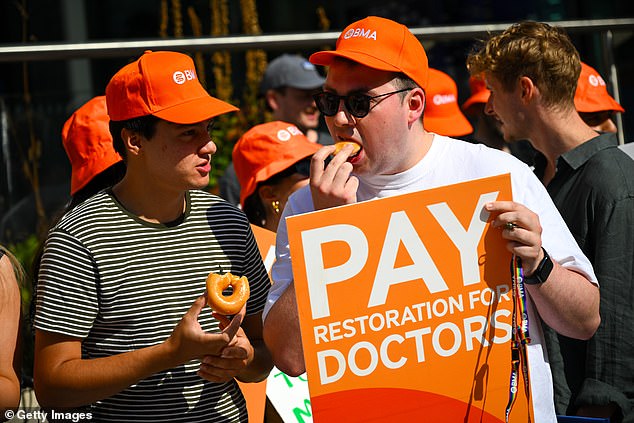The NHS is braced for more chaos amid fears nurses will reject their pay deal and join junior doctors in taking strike action.
The Royal College of Nursing (RCN) has been holding a vote among its members on the 3.6 per cent pay rise, with the results to be announced later this week.
The trade union has previously branded the pay offer as ‘grotesque’ as doctors, teachers, prison officers and the Armed Forces all received a bigger increase.
They have claimed nursing staff will see the pay rise ‘entirely swallowed up by inflation‘.
According to the BBC, the results of the RCN vote will show an ‘overwhelming’ rejection of the deal.
Union bosses are expected to demand the Government negotiate over the summer to avoid a formal ballot for strike action in the autumn.
It comes days after GMB health workers, including ambulance crews, rejected the Government’s pay deal.
The union said its members voted by 67 per cent against the 3.6 per cent pay award offered for 2025/26 in England.

The NHS is braced for more chaos amid fears nurses will reject their pay deal. Pictured: Members of the Royal College of Nursing on a picket line in 2023

Thousands of resident doctors, previously known as junior doctors, began a five-day walkout on Friday
Thousands of resident doctors, previously known as junior doctors, began a five-day walkout on Friday.
Relations between the Government and British Medical Association (BMA) have soured amid their own dispute about pay.
Health Secretary Wes Streeting has said the union will not be allowed to ‘hold the country to ransom’ after receiving a 28.9 per cent pay award over the last three years, the highest across the public sector.
But the BMA has said, despite this uplift, pay for resident doctors has declined by a fifth since 2008 once inflation is taken into account.
Mr Streeting is now braced for a separate dispute with nurses over pay, following the closure of the RCN vote.
An RCN spokesman said: ‘The results will be announced to our members later this week.
‘As the largest part of the NHS workforce, nursing staff do not feel valued and the Government must urgently begin to turn that around.’
A Department of Health and Social Care spokesperson said new full-time nurses would receive £30,000 in basic pay for the first time this year following previous pay rises.
They added: ‘This Government is clear we can’t move any further on headline pay but will work with the RCN to improve their major concerns, including pay structure reform, concerns on career progression and wider working conditions.’
Tory leader Kemi Badenoch has pledged to ban doctors’ strikes if the Conservatives return to power.
She vowed to introduce legislation to block medics from taking widespread industrial action, placing the same restrictions on them that apply to police officers and soldiers.
The Tory plans would see minimum service level requirements – which were brought in for some sectors by the previous government and scrapped by Labour – introduced across the health service.
The only people restricted from going on strike in the UK under existing laws are police officers and members of the Armed Forces.
Shadow health secretary Stuart Andrew said: ‘Labour have lost control of the unions and it’s putting lives at risk.
‘Strikes by resident doctors as well as potential strikes by nurses and ambulance workers could mean more chaos this summer, with patients and the vulnerable paying the price.
‘The public deserves leadership, not hand-wringing.
‘That’s why under Kemi Badenoch’s leadership, the Conservatives will take decisive action: we will work with the government to face down the militant BMA, we will ban doctor strikes and guarantee minimum service levels to keep patients safe.
‘Labour are letting the unions run the NHS. It is time to put patients before union politics to avoid a summer of strikes.’
Julie Thallon, chair of the Patients Association, said: ‘We’re increasingly concerned that patients will continue to bear the brunt of ongoing industrial action across the NHS.
‘With more healthcare unions now rejecting pay offers, the prospect of additional strikes looms and further pressure on an already overstretched system.
‘Patients have faced unacceptable delays and uncertainty for far too long.
‘Every new wave of disruption risks worsening people’s health and wellbeing, while chipping away at trust in a system meant to care for them.’
Rory Deighton, acute director at the NHS Confederation, said: ‘NHS leaders are very concerned about the possibility of prolonged strike action and impact it will have to services and patients.
‘Our members have been working incredibly hard to keep patients safe during the ongoing strikes but prolonged strikes will make it much for difficult for health leaders to minimise disruption.
‘We hope that the BMA and other unions will get round the table and work out these disputes without the need for staff to down tools.
‘Ultimately, more strikes are likely to leave more patients waiting in pain or discomfort for the vital treatments they need.’
Saffron Cordery, deputy chief executive of NHS Providers, which represents NHS trusts, said: ‘It is very worrying to see that even as trusts are working to contain the harm caused by the current resident doctors’ strike, there is the possibility of wider industrial action that could bring yet more disruption.
‘Whatever happens, trust leaders will continue to work with colleagues to minimise the impact on patients.
‘It is important that all sides engage with each other in a respectful, positive and constructive manner, recognising the importance of maintaining good relations between different staff groups and the overriding consideration of patient safety.
‘What we need now, from both sides, is pragmatism. No one can afford further disruption to services that are already under pressure.’












